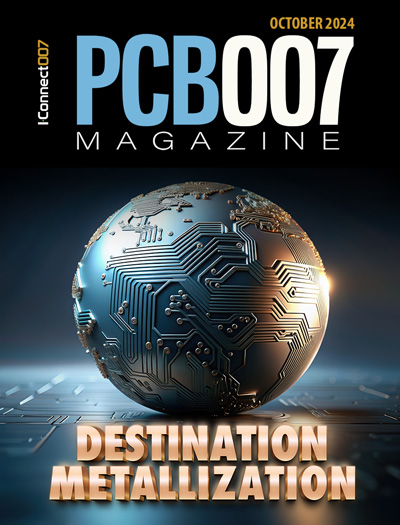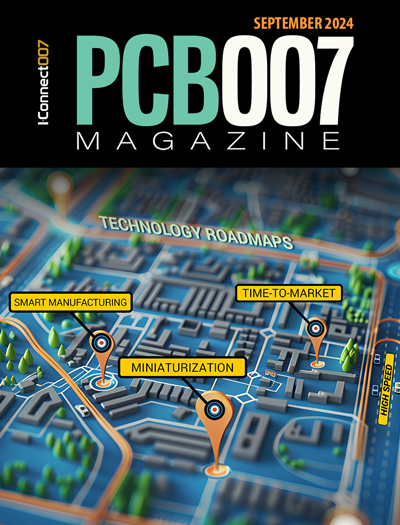-

- News
- Books
Featured Books
- pcb007 Magazine
Latest Issues
Current Issue
Engineering Economics
The real cost to manufacture a PCB encompasses everything that goes into making the product: the materials and other value-added supplies, machine and personnel costs, and most importantly, your quality. A hard look at real costs seems wholly appropriate.

Alternate Metallization Processes
Traditional electroless copper and electroless copper immersion gold have been primary PCB plating methods for decades. But alternative plating metals and processes have been introduced over the past few years as miniaturization and advanced packaging continue to develop.

Technology Roadmaps
In this issue of PCB007 Magazine, we discuss technology roadmaps and what they mean for our businesses, providing context to the all-important question: What is my company’s technology roadmap?
- Articles
- Columns
Search Console
- Links
- Media kit
||| MENU - pcb007 Magazine
A PCB Manufacturers’ Representative Point of View
July 7, 2016 | Barry Matties, I-Connect007Estimated reading time: 7 minutes
I met with long-time PCB manufacturers’ representative David Lanagan of Mandalay Technologies at the recent Geek-A-Palooza event, to discuss the current state of the Southern California market and the challenges of doing business there.
Barry Matties: David, tell us a little bit about Mandalay and what your company does.
David Lanagan: I am a typical manufacturers’ representative. I came here representing Prototron Circuits, which is one of my printed circuit board lines. My company services Southern California, primarily focusing on manufacturing services, which includes circuit boards, circuit board assembly, wire harnesses, plastics, sheet metal, stamping and machine parts.
Matties: How long have you been an independent rep?
Lanagan: This is my 14th year.
Matties: I don't want to catch you off-guard or sandbag you or anything, but I hear good and bad things about reps. Mostly, I hear the negative side of reps. Tell me why someone would make the case for reps?
Lanagan: One of the things that my company brings to the party is I've been a direct sales person/manager as well, and I've worked for some of the larger manufacturing companies, like Benchmark Electronics, so I've got a lot of industry expertise. The one bad rap that reps get is everybody feels that they're commissioning on top of the price, and everybody is looking to save money right now. Generally, the price is set and the commission is taken from the manufacturer’s profit.
I call myself more of a service provider. Yes, I am getting paid commission on what I sell, but I am a full service rep. I have some engineering expertise. I have plenty of manufacturing expertise. I understand a lot about the lean manufacturing model, which everybody is using nowadays. I bring that to the party too. I'm not just the guy that sells you something and then disappears.
Matties: Not just a sales guy.
Lanagan: Well, I am a sales guy, but I like to think of myself as more of a service-oriented sales person.
Matties: When we think or hear about reps versus direct, a lot of times over the years people will hire a rep, get the customers, and then the rep goes away and they feel like they own the customers. Does that sort of dynamic happen frequently?
Lanagan: That is really driven by the customer’s wants. I do have customers that are much more comfortable dealing directly with the factory, which is fine with me. To me, it's whatever makes them most comfortable and is most efficient for them.
I have been doing this for a lot of years. I am 57, and I have more than 30 years in sales and marketing. People know me and trust me and understand what I have to offer. My ego never gets in the way of closing a deal. If they would rather work directly with the factory, I have no problem with that. My agreement with the factory is such that I get paid either way. I prefer to work with the customer, but if they are more comfortable that's fine with me.
Matties: It's really about the customer needs.
Lanagan: Yes—whatever they want.
Matties: What sort of challenges are you seeing with regard to selling technology these days?
Lanagan: I sell specifically to the Southern California marketplace. This is probably the third or fourth time we've transitioned through industries. When I initially started, it was a heavy military world, back when Litton was in business and Hughes was doing research and companies like that.
From that we transitioned into a very heavy semiconductor test equipment market. It was Schlumberger, Teradyne, and Credence and all of these kinds of companies, and then they all went away or moved and we went into telecommunications when Ixia and Intel came into town, and all those companies were lighting up the marketplace. That market is very volatile. They're still here, but most of that business is now focused up in the Bay Area and lower cost manufacturing areas.
What's still left in Southern California now is some military, industrial, lower volume manufacturing and some medical, although medical is starting to go offshore now, too. The thing for a salesperson to know here is you have to adapt. You really have to adapt.
Matties: You sell box builds, CM, bareboard, etc. What's the appetite like out there? Are buyers looking for a single source type of supplier or is it still more piecemeal?
Lanagan: It's mostly still piecemeal onshore. What I like to focus on is being strictly a domestic manufacturing guy. I don't sell anything offshore. The companies that I'm dealing with are the ones that are willing to pay a little bit more for domestic quality and domestic service. It's more low-volume, high-mix type commodities. A lot of people are focused on the really high-volume stuff, but they're bringing that in from China. Any of the commercial commodities and things like that are coming in from China.
I'm more focused on people that are building product. Not necessarily in California, but in the United States. They're sourcing out of California, at least. A lot of engineering things like that.
Matties: What's your sense of the market?
Lanagan: Right now Southern California, if I'm being honest, is pretty soft. There's not a lot of growth. Medical is growing quite a bit, but again, it's a cost-driven market now. It's pretty tough. You have to adapt, like I said.
Matties: Even with the cost-driven market, when you're trying to sell a higher value or quality service, people say they are willing to pay for it, but when it comes to sign the deal price becomes an issue.
Lanagan: In most cases, cost is still king. There are some things you can offer, like shops offering ITAR and AS9100. If you are qualified for specialty materials and things like that, you have to differentiate yourself a little bit in order to stand out from the competition. Especially in the board business because there's so many board shops right now. Especially in California.
Matties: Because it's such a price-sensitive market, how is customer loyalty?
Lanagan: It's still there, but not like the old days. I'm an older guy, and relationships used to be king. You would have a relationship with your buyers, your engineers and your commodity managers, and they would stay with you simply because they knew you were going to be fair and take care of them. Now the publicly-held companies are all judged on profit, so the buyers and the engineers may want to deal with you, but cost is becoming king, especially on price-driven commodities. Not much you can do about that, though.
Matties: It's just the world we live in, right?
Lanagan: Pretty much. Relationships are still important, but an outside sales guy used to have six meetings a day. They are lucky to get six meetings a week now because people just simply don't have the time.
Matties: What about online ordering? I see a lot of board fabricators transitioning to a “Come to our website, place your order, and we’ll take care of it” approach.
Lanagan: Yeah, the “no touch” guys are out there but I don't sell for them.
Matties: I think some of them might say that they don't need traditional sales people.
Lanagan: They don't. Because what they're really selling is a low-tech commodity, in my opinion, and they are nesting their builds. Some suppliers are taking as an example, four-layer boards using a certain material and thickness, and they're putting four or five customers’ boards in a panel. I can't do that.
Matties: It doesn't sound like that's the market you’re after anyway.
Lanagan: No it's not. That's where the cost-driven market is. I'm just not interested in dealing with it.
Matties: To me, I think the risk is it's a blind relationship. You never know your customer, in that regard.
Lanagan: For some people that's fine. Especially in the prototype board business, a lot of engineers are designing at home at night. A lot of guys are outsourcing engineering offshore and they can just come onto the Internet and plug info in at midnight and get boards two days later.
Matties: What does a typical buyer look like? Are you dealing with more circuit designers as buyers or are there specific titles?
Lanagan: In the prototype board business, you're really dealing with the double E’s, design guys, layout guys, and people like that. In the production board business you're dealing with buyers and supply chain professionals.
Matties: And they are just price-sensitive?
Lanagan: In most cases.
Matties: Because all the technology is proven and everything is just there.
Lanagan: Yeah, once the board is designed. If you can get in on the prototype and you’re a production shop, then hopefully, you'll get at least a look at the production. That's the idea, but you just never know.
Matties: Is there anything that we haven't talked about that you would like to share?
Lanagan: I don't think so. Geek-A-Palooza has been a pretty interesting show. I like it so far. For the first one it's well attended.
Matties: I think so too. It's a great venue and they have a great format for what they're doing.
Lanagan: I agree with you 100%.
Matties: Thank you so much.
Lanagan: Thanks, Barry. I appreciate it.
Suggested Items
Intervala Hosts Employee Car and Motorcycle Show, Benefit Nonprofits
08/27/2024 | IntervalaIntervala hosted an employee car and motorcycle show, aptly named the Vala-Cruise and it was a roaring success! Employees had the chance to show off their prized wheels, and it was incredible to see the variety and passion on display.
KIC Honored with IPC Recognition for 25 Years of Membership and Contributions to Electronics Manufacturing Industry
06/24/2024 | KICKIC, a renowned pioneer in thermal process and temperature measurement solutions for electronics manufacturing, is proud to announce that it has been recognized by IPC for 25 years of membership and significant contributions to electronics manufacturing.
Boeing Starliner Spacecraft Completes Successful Crewed Docking with International Space Station
06/07/2024 | BoeingNASA astronauts Barry "Butch" Wilmore and Sunita "Suni" Williams successfully docked Boeing's Starliner spacecraft to the International Space Station (ISS), about 26 hours after launching from Cape Canaveral Space Force Station.
KIC’s Miles Moreau to Present Profiling Basics and Best Practices at SMTA Wisconsin Chapter PCBA Profile Workshop
01/25/2024 | KICKIC, a renowned pioneer in thermal process and temperature measurement solutions for electronics manufacturing, announces that Miles Moreau, General Manager, will be a featured speaker at the SMTA Wisconsin Chapter In-Person PCBA Profile Workshop.
The Drive Toward UHDI and Substrates
09/20/2023 | I-Connect007 Editorial TeamPanasonic’s Darren Hitchcock spoke with the I-Connect007 Editorial Team on the complexities of moving toward ultra HDI manufacturing. As we learn in this conversation, the number of shifting constraints relative to traditional PCB fabrication is quite large and can sometimes conflict with each other.


